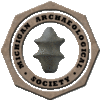Officially incorporated as a non-profit organization in 1954, the Michigan Archaeological Society traces its origin to 1924 when a group of professional and amateur archaeologists decided that ” a united effort was necessary to assemble the data at hand and further search for additional evidence of man’s early occupancy of Michigan”. Today’s Michigan Archaeological Society continues a long tradition of close ties between professional and amateur archaeologists who both pursue the goals articulated in the MAS constitution: ” to investigate, research, record, and conserve archaeological sites and artifacts; to cooperate with universities, colleges, and museums with similar interests; and to exchange and disseminate information on such subjects “.
The MAS is a state-wide organization with members dispersed across the lower and upper peninsulas. Individuals and institutions from adjacent states and Canada are also welcomed as members. At the state level, the MAS holds an annual meeting in April of each year with the morning devoted to society business and the afternoon devoted to presentations by professional and avocational archaeologists on topics of current interest, usually the results of their latest excavations and research. The society publishes a journal called The Michigan Archaeologist. For more information about the journal click on Our Publication. The society from time to time organizes conferences and workshops, generally in the fall. Workshops can include field schools at archaeological sites where members learn how to properly excavate and record information through hands on experience.
State Officers for 2023-2024:
President: Dan Wymer maspresident@micharch.org
1st Vice President: Tim Bennett masfirstvp@micharch.org
2nd Vice President: Shirley Shane massecondvp@micharch.org
Secretary: David Cusack massecretary@micharch.org
Treasurer: Don Weir mastreasurer@micharch.org
Trustee (2023-2026) Mickey Kress mastrustee2017@micharch.org
Trustee (2022-2024) Hannon Hylkema mastrustee2018@micharch.org
Trustee (2022-2025) Mark Lange mastrustee2019@micharch.org
The state level society is also an umbrella organization for local MAS chapters where members who reside in the same geographic area come together as a group. Local chapters meet regularly, usually monthly, and offer an opportunity to spend time with people who live near you and share your interest. Acquaintances that begin in chapter meetings often become lifelong friendships. At chapter meetings you can participate in collaboration between local avocational and professional archaeologists, become involved in locally focused activities and events, and hear interesting guest speakers. Members often bring artifacts, and stones they think might be artifacts, to chapter meetings for other members to look at. The MAS currently has eight active chapters and MAS members are strongly encouraged to become involved in a nearby local chapter if one exists, or to form a new one if five or more MAS members reside in an area that does not yet have a local chapter.
For more information about a specific chapter please click on one of these links:
Huron Valley Chapter – Ann Arbor
Upper Grand Valley Chapter – East Lansing
Coffinberry Chapter – Grand Rapids
Saginaw Valley Chapter – Saginaw
Northwest Michigan Chapter – Traverse City
The MAS has an awards program to recognize and honor members who have made important contributions to archaeology. For more information about MAS awards click here.
If you would like more information on how the MAS is structured and functions as an organization click on the Constitution and By-Laws below.
If you would like to view the Code of Ethics for Michigan Archaeological Society Members click below.
For more information on the history of the MAS click on the link below which will take you to the Bentley Historical Library where MAS records are archived.
